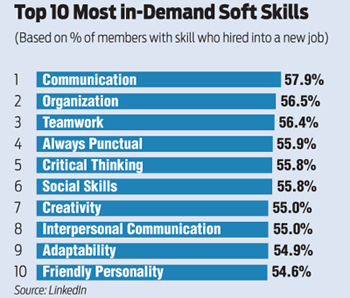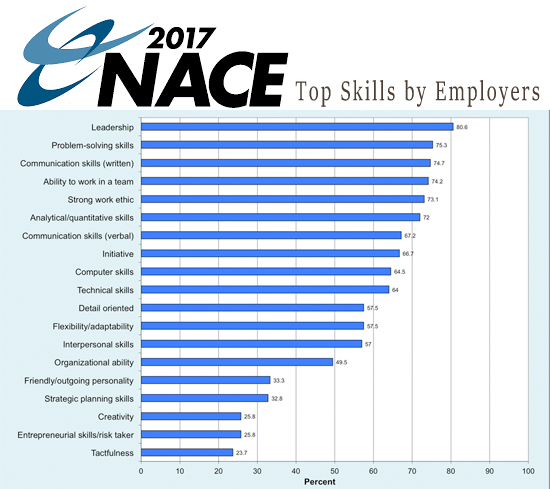Starting a New Job; On the Right Foot!
June 20, 2017 Leave a comment
(By Samantha Gonnelli – C2C Career Advisor)
You submitted your application, aced your interviews, said your “Thank You’s,” and were just offered the job! Congratulations! Effectively showcasing all that you have to offer via your resume and an interview is challenging, but you managed to impress your new employer and have just signed on with an organization. Now it is time to show your employer, as well as your new colleagues, that they made the right decision and that you do, indeed, have the skills necessary to do the job well. With that said, your “hard” skills, i.e. the specific, quantifiable skills you learned through your coursework, internships, etc., are only part of what you need to be successful at your new job. It is your “soft” skills that will prove just as important. Soft skills refer to the abilities we gain through social and emotional learning, e.g. self-regulation, organization, relationship building, communication, collaboration, conflict resolution, etc. These skills, according to last year’s NACE (National Association of Colleges & Employers) Job Outlook Survey, make up 17 of the 19 attributes that employers look for in applicants and, by extension, prospective employees. The attributes, in order of importance, are:
Notice, of the list, only two are ‘hard skills;’ computer and technological!
I first learned about the importance of honing your soft skills when I was studying Education in college, but I truly observed their importance as a counselor on the K-12 level. In this role, I have learned that soft skills can be taught, although there is not typically a specific focus on doing so in traditional school settings. Teachers often provide students with the opportunity to practice these skills, but they are rarely able to provide them with concrete feedback regarding their use. This is not the fault of teachers, but rather due to the lack of emphasis on social and emotional learning in modern curriculum. The results of the 2016 NACE Job Outlook Survey reveal that our heavy focus on hard skills, and our subsequent neglect of soft skills, is not in the best interest of students because employers clearly value soft skills. This is especially important to remember when beginning a new job. To start your job on the right foot, you must be able to demonstrate the following soft skills:
Dependability/Reliability
Initiative
Commitment
Communication
Teamwork
Leadership
Flexibility
Time Management and Organizational Skills
Demonstrating the aforementioned skills, most of which are listed in Hillary Obepeul’s article about soft skills for graduate students at the University of Cincinnati, will help you make a good impression at work instantly. At the top of the list is dependability. Punctuality and the ability to meet deadlines are critical. Arriving to work on time, staying on task during the workday, and submitting your work by the assigned deadline help you build trust with others, which is a key part of building relationships. When others recognize that you are someone they can trust to come prepared to work everyday, they will go to you for assistance, seek out your expertise, and, ultimately, help you to attain success in your position; however, more is required than just your reliability.
Your interest and passion for your work should be evident to your new colleagues, not just because of what you say, but what you do. You have to take the initiative to complete your work to the best of your ability every time and learn how to take constructive criticism, thereby allowing you to reflect on your current practice and improve for the future.
Employers also want to know that you have a strong commitment to their organization, which you can demonstrate by submitting excellent work, incorporating feedback into your practice, and, eventually, making contributions to the organization at large.
Effective communication is integral, especially when beginning a new job. It is important to interact with your colleagues, superiors, and, if applicable, clientele in a clear, professional, and polite manner, both verbally and in writing. Take the time to introduce yourself to your co-workers and focus on listening to what they have to say; after all, they know how the organization functions and can help guide you when you have questions. Being nice, in general, goes a long way and will not soon be forgotten. It will also assist you when you need to engage in teamwork and help you gain the respect of your co-workers when you are given the opportunity to exercise your leadership skills.
When starting a new job, it helps to illustrate your flexibility and show that you can gracefully adjust to a variety of situations. You may not be assigned to the exact role you were initially promised or given the same responsibilities that were discussed during your interview, as the needs of your organization may change. If the role changes drastically, I would advise addressing this sooner rather than later so that you can determine if the job is still a good fit for you; ultimately, however, it is important to remember that everyone needs to start somewhere and, often, there is a room to grow. Do not forget, changes can be made!
Showing that you are able to prioritize effectively and meet deadlines is also key to your success in a new position. This takes excellent time management and organizational skills. Maintain a calendar and create an organizational system that works for you. My best tip here is to take paper and a writing utensil with you to all meetings, both impromptu and formal. This will help you keep track of what needs to get done as well as make note of your contacts. If you are prone to procrastination and/or struggle with organization, I recommend asking someone you respect, who has mastered these skills, for advice and then making a genuine effort to improve in whichever area you find challenging. This will help you gain a strong reputation at work, complete tasks more efficiently, and ensure that you always meet your deadlines.
In short, focus on fine-tuning your soft skills and make use of them when beginning a new job; they will, unmistakably, help you thrive in the workplace.


Please Share Us!